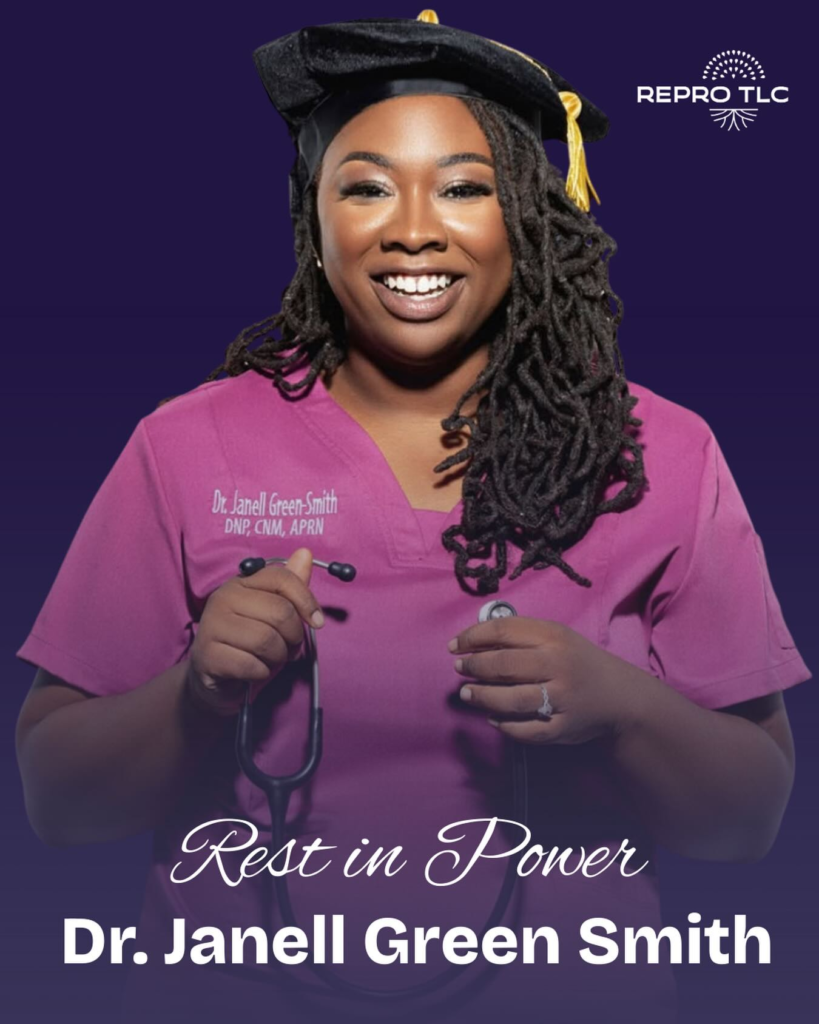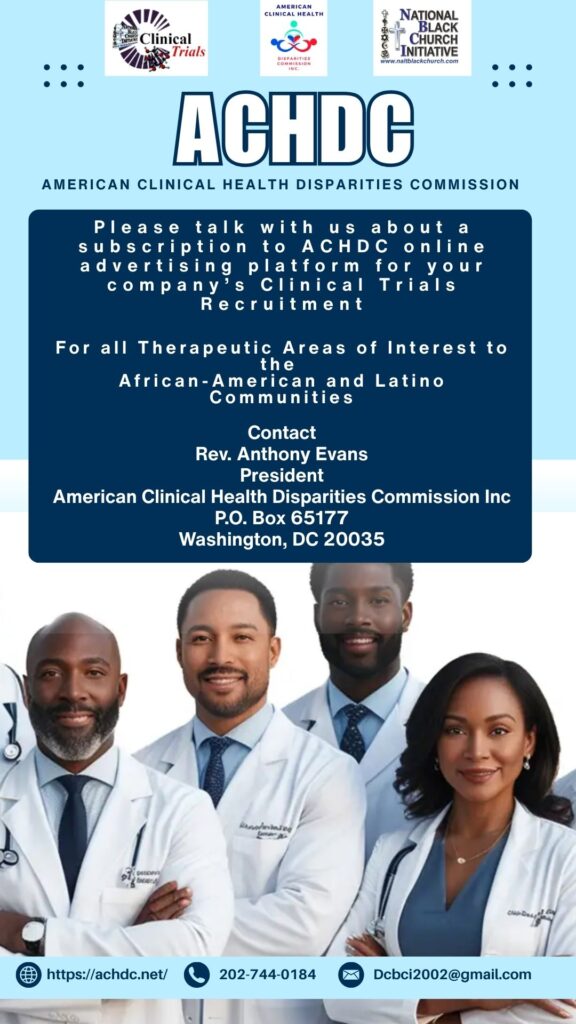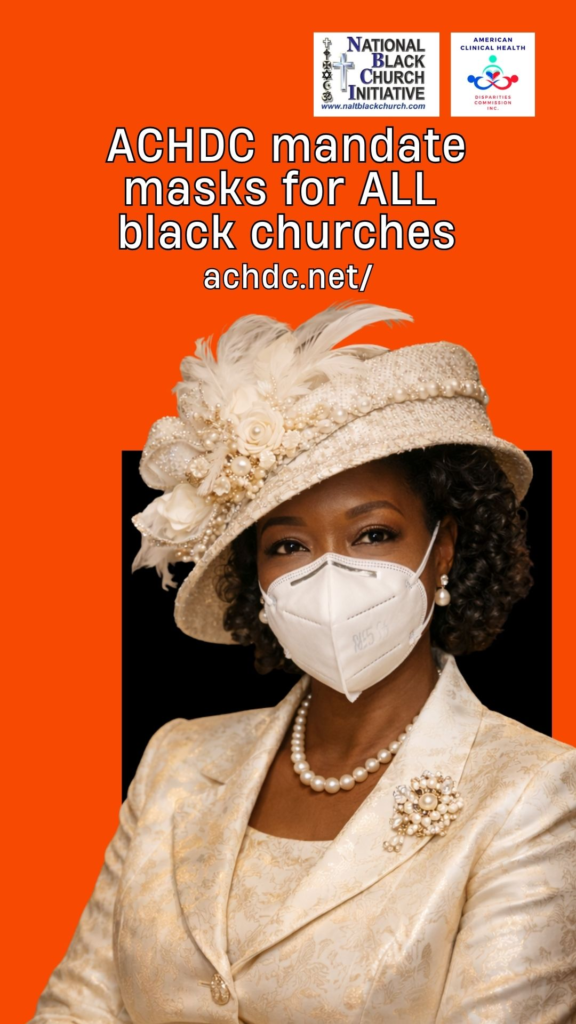This a part of NBCI Revolution in Black Health in realizing A National Black Health Agenda
https://blackchurchclinicaltrials.com/files/update-blackhealthagenda-congress.pdf (Opens in a new tab)
Particularly given the unethical and illegal behaviors involved with the Tuskegee Experiment and the intentional absence or lack of critical information for the involved subjects by governmental officials, NBCI engages in a comprehensive approach to utilize important lessons learned from historic medical abuses for generating robust interest in substantially improving clinical trial participation.



The American Clinical Health Disparities Commission (ACHDC), National Black Church Initiative (NBCI), and CME Outfitters (CMEO) today announced the launch of a partnership to address the dismally low recruitment, participation, and retention of African Americans in clinical trials. Additionally, the partnership will aim to address health inequities and improve health literacy, messaging transcreation, and amplify the voice of the patient, particularly in marginalized and under-resourced communities.
ACHDC is a coalition created by African American and Latino clinicians and clergy to educate, generate interest, and improve clinical trial participation among NBCI constituents. NBCI is a coalition of 150,000 African American and Latino churches constituting 27.7 million members working to eradicate racial disparities in healthcare, technology, education, and housing for each of its members, congregants, churches, and the public. CMEO is an award-winning accredited provider of continuing medical education with a substantial catalog of clinician and patient education focused on unconscious bias, health inequities, and diversity, equity, and inclusivity.
NBCI, supported by education and resources developed by CMEO, provides critical wellness information to all of its members, congregants, churches, and the public and will work hand-in-hand with ACHDC to help achieve health equity among its constituents, particularly through increased awareness of and informed participation in clinical trials. This innovative and groundbreaking partnership will provide a structured, comprehensive, academic course emphasizing the historical importance of clinical trials along with their risks and benefits, underscoring the critical role of informed consent. The goal is to create, for the very first time, a large pool of African Americans who have been empowered through education on clinical trial participation to improve the overall health of Latinos and African Americans.
The health equity gap in the US is so vast that you could refer to it as a chasm. Marginalized groups, especially African Americans and Latinos, have worse outcomes with various health conditions, and worse, when it comes to clinical research to treat and prevent, these groups are grossly underrepresented. Closing that gap has taken great effort, and the Black church has stepped up and taken the lead. The National Black Church Initiative National Clinical Trials Strategic Plan (NCTSP) (https://naltblackchurch.com/pdf/nbci-ntcsp-slides3.pdf) has mirrored the call by the National Academies report on Improving Representation in Clinical Trials and Research, and the organization urges the FDA to use it as a blueprint.
 Reaching Black people on major issues starts with going where they are. Historically, Black churches have been a resource and refuge in their communities, and they’re helping to build trust with clinical trials.
Reaching Black people on major issues starts with going where they are. Historically, Black churches have been a resource and refuge in their communities, and they’re helping to build trust with clinical trials.

Our Research Recruitment Registry aims to create and maintain a research participant database of African Americans interested in learning about and potentially participating in future studies relevant to their medical condition.
ACHDC’s chief objective is to provide NBCI with overall scientific direction and guidance in education, literature, and video development, clinical trial protocols, and guidelines for critical data collection.
To create a world where every individual, regardless of background, has equal access to health opportunities, clinical research reflects our society’s diversity and barriers to health equity are dismantled through collaborative efforts among the clergy, healthcare practitioners, and communities.
We aim to empower minority communities by increasing their participation in clinical research, advocating for equitable health policies, and addressing systemic barriers to health equality. We aim to foster an inclusive environment where health, education, economic stability, cultural enrichment, and environmental sustainability intersect to support the well-being of all individuals.
Goal: Increase minority participation in clinical research and improve health outcomes across diverse populations.
Methods for Measuring Outcomes:
Goal: Enhance educational opportunities and awareness of clinical research and health equity in minority communities.
Methods for Measuring Outcomes:
Goal: Promote economic stability and access to resources necessary for health and research participation among minority populations.
Methods for Measuring Outcomes:
Goal: Celebrate and integrate cultural diversity in health research practices and promote cultural competence within the healthcare system.
Methods for Measuring Outcomes:
Goal: Leverage the arts to raise awareness about health equity and encourage participation in clinical research.
Methods for Measuring Outcomes:
Goal: Integrate environmental sustainability into health research and promote practices supporting health and ecological well-being.
Methods for Measuring Outcomes:
This comprehensive approach ensures that ACHDC can measure its impact across various societal dimensions while driving meaningful progress toward health equity and sustainability.
Through regular consultations, feedback sessions, and participatory approaches, foster active community involvement.
ACHDC will help develop guidelines and best practices for the NBCI National Clinical Trial Strategic Plan (NCTSP)
https://blackchurchclinicaltrials.com.
These African-American clinicians will provide the necessary technical assistance to help NBCI fully implement this plan for its 27.7 million members. ACHDC will serve as the ethical and scientific safeguard to assure African Americans that all clinical trials are within the HIPAA guidelines and compliance — and that we will never allow a Tuskegee experiment to ever happen again. ACHDC will evaluate all clinical trials agreed to by NBCI that they are within acceptable clinical practice and guidelines.
ACHDC will approve all informed consent agreements before these trials are shared, advertised, and encouraged for NBCI member participation. Critical to ACHDC’s core mission is to ensure that these protocols are followed and agreed to by all parties. We believe that this approach is essential and critical in building the trust factor to assure all African Americans that clinical trials are safe, beneficial, necessary, and above all, all risks are fully disclosed and it is of the highest ethical standards by both the government and the pharmaceutical industry.
Black Americans have largely positive views of medical researchers’ competence; the majority are concerned about the potential for misconduct
Science offers the promise to aid society in tackling its most pressing problems, lifting living standards, health and life expectancies. Learning about science can enrich people’s lives in and outside of the classroom, and advances in scientific developments can spark amazement while transforming the ways we live and work.
A new Pew Research Center survey takes a wide-ranging look at Black Americans’ views and experiences with science, spanning medical and healthcare settings, educational settings, and as consumers of science-related news and information in daily life.
The COVID-19 pandemic is a prominent reminder of the disparate health impacts Black Americans face, and of long-standing concerns about levels of trust or mistrust between scientists and Black communities.
Against this backdrop, there are ongoing concerns that the segments of the public most engaged with science – people who attend science-related events, participate in medical research studies, and fill science, technology, engineering, and math classrooms and the professional ranks of these fields – do not adequately reflect the racial and ethnic diversity of the nation.
The new survey, along with a series of focus groups, highlights the multifaceted views Black Americans hold when it comes to trust in medical research scientists. The findings speak to how contemporary experiences with the healthcare system, as well as past injustices, inform the range of attitudes Black adults express. In this and other topics addressed in the survey, there are important differences in how Black Americans see these issues depending on their education, age, gender, and other characteristics.
The importance of representation for Black Americans is a through-line seen across the topics covered in the survey. A majority of Black Americans say more examples of Black high achievers in science, technology, engineering, and math (STEM) would encourage more young Black people to pursue training in these fields. Issues around representation are at the center of doubts some focus group participants expressed about the openness of science-related professions to Black people.


The confusion surrounding immunization and vaccines constitutes a national health crisis for the African American community. The purpose of this report is to seek clarification, financial resources, and technical support from HHS, NIH, the CDC, and the FDA due to the evolution of the public health environment.
The National Black Church Initiative (NBCI), a coalition of 150,000 African American and Latino faith communities comprising 27.7 million members, has released a 43-page report on the confusion surrounding vaccines and their effects on vulnerable populations. The report, “Vaccines Are Good for America”, focuses on the need for vaccines and the negative consequences of the confusion for African Americans, Latinos, young children, immunocompromised adults, and the poor.
The National Black Church Initiative (NBCI), a coalition of 150,000 African American churches and 27.7 million members, launches the National Clinical Trials Strategic Plan (NCTSP) to inform, empower, educate, enroll, and maintain African Americans in Clinical trials. This will prove to be one of the most significant efforts to improve health in the African American community. This is truly a historical moment for the Black churches as they seek to build and sustain an interdisciplinary approach.
The National Black Church Initiative is now inviting submissions of scientific papers for its online publication, Enroll Now Magazine. NBCI publishes Enroll Now Magazine online in conjunction with the American Clinical Health Disparities Commission (ACHDC). Enroll Now regularly includes articles by ACHDC members. Yet this is only one part of its mission. The overarching purpose of Enroll Now is to provide a platform for illuminating critical health data and other information for NBCI’s 27.7 million members and the interested public. Enroll Now achieves this by also publishing: scholarly articles focused on curtailing African American mortality and morbidity; editorials on racial health disparities; notices on clinical trials on behalf of our future partners; and views on clinical trials from members of our congregations. This Call for Submissions is for the areas of interest listed below, and papers may have multiple authors. The submission deadline is June 2026. The review panel, composed of NBCI and ACHDC reviewers, will evaluate all submissions. Please submit your papers for review, and all questions, to:


CONTACT US
Rev. Anthony Evans
President
American Clinical Health Disparities Commission Inc
P.O. Box 65177
Washington, DC 20035
202-744-0184
blackchurchclinicaltrials.com
HIPAA Compliance Officer: William Joseph
DISCLAIMER
Disclaimer
This page has links to a PDF file,
Get Adobe Reader